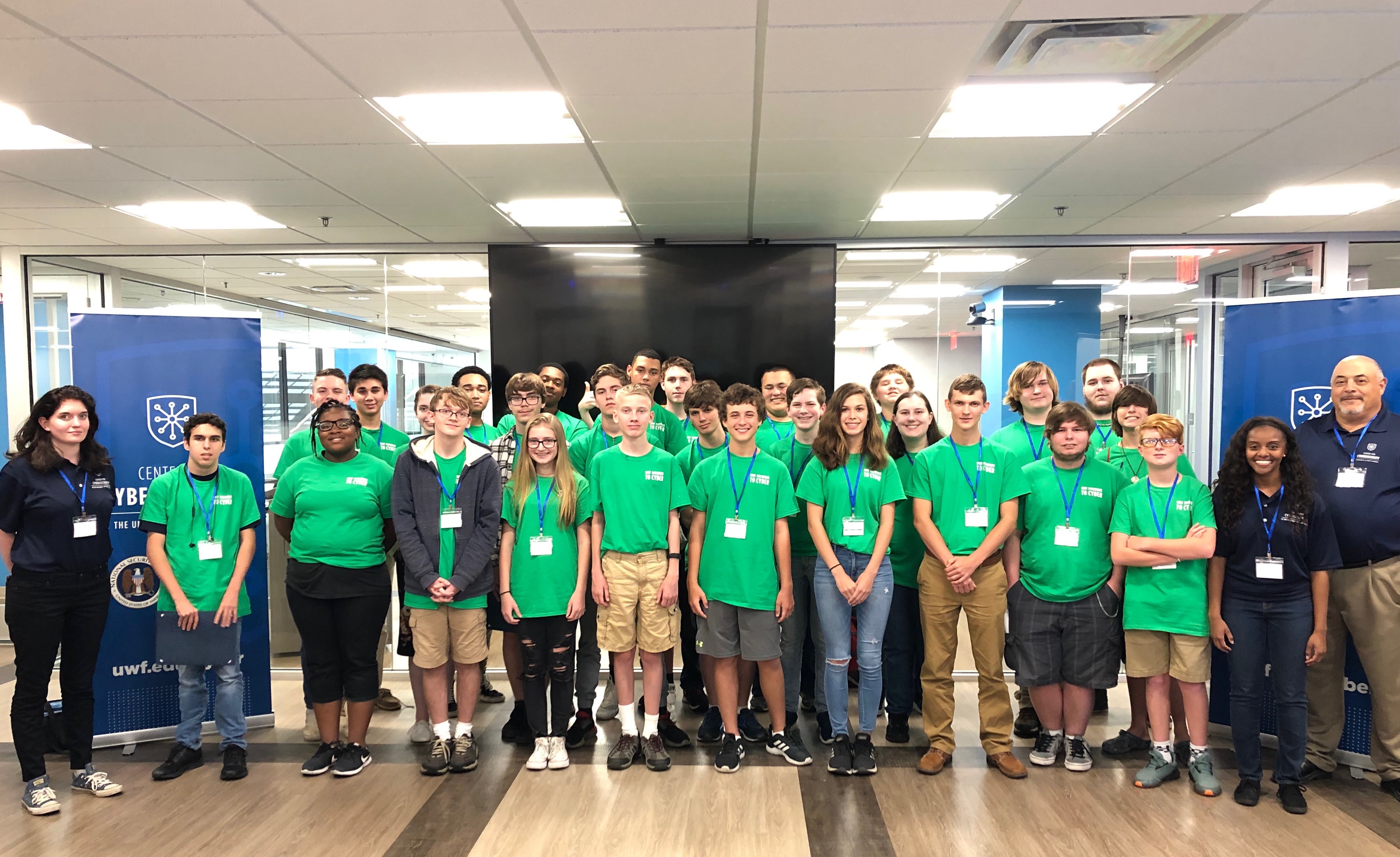UWF summer camps enhance community's cybersecurity awareness
June 21, 2019

Asked to name her favorite activity at the University of West Florida Pathways to Cyber Student Camp, Navarre High School freshman Jasmine Mhoon smiled and said, “Everything was amazing.”
The UWF Center for Cybersecurity hosted student and teachers camps in June to enhance cybersecurity awareness in the community and fulfill its mission to serve as the regional hub for innovative cyber solutions that integrate multidisciplinary education, research and community partnerships.
Educators in grades 1-12 participated in the UWF GenCyber Guiding Cyber Mentors camp, the only GenCyber Camp in Florida funded by the NSA and National Science Foundation. Dr. Brian Eddy, Computer Science assistant professor, Dr. Tirthankar Ghosh, Center for Cybersecurity professor and associate director, and Pine Forest High School cybersecurity teacher Angela Irby served as instructors.
The 20 teacher participants learned about cybersecurity concepts and cybersecurity ethics through hands-on activities and concluded the camp by presenting lesson plans on cybersecurity topics. Bellview Middle School teacher Ena Floyd Johnson presented her lesson plan on password security after hearing a lecture on password complexity and participating in a password hacking activity earlier in the week.
“Just being reintroduced to the information about the passwords and just knowing how easy it is for a hacker to be hacked, much less a normal person like me, was valuable,” Johnson said. “I know there’s more for me to learn about being hacked so that my passwords are secure. There’s a lot of information I can take back to my classroom. For example, making sure when students take pictures and post them they know what should be private and what should be public, giving them that knowledge for how to use the internet properly.”
Jonathan Arneault, IBM Director, North America Software-as-a-Service, Center of Excellence and Go-To-Market Transformation, served as a guest speaker on the first day of the Guiding Cyber Mentors Camp. Arneault told the 20 teachers at the camp that computer engineer was a nonexistent profession in his formative years. He advised the teachers to prepare students for the impossible-to-predict future by encouraging them to explore where their curiosity leads them.
"Your students will have jobs, will have opportunities that nobody's imagining today,” Arneault said. “So how do we train, create and educate for something that does not yet exist and we do not know whether it can exist? Let (students) be curious and train them on how to take curiosity into a journey of self-learning."
Three other professionals from the private or government sectors shared their cybersecurity expertise with the teachers. Mike Arbrouet, an AppRiver system/application security analyst, John Corliss, U.S. Department of Homeland Security senior computer scientist, and Cyber Safe Workforce LLC founder and CEO Michelle Ward provided career tips for the teachers to share with their students. The three panelists cited critical thinking, innate curiosity and the desire to utilize free tools as important traits for students pursuing cybersecurity careers.
Corliss told the teachers that the cybersecurity workforce consists of a significant number of professionals outside of the technical realm.
“One thing you’ll see in the cyber community is it takes all kinds,” said Corliss, a UWF alum. “Technical people are critical, but people who know how to make things tick are just as critical.”
The UWF Pathways to Cyber Student Camp attracted 30 high school students from across Northwest Florida. Anthony Pinto, Center for Cybersecurity faculty fellow, and Guy Garrett, Center for Cybersecurity assistant director, served as instructors.
The students received a crash course in Linux commands, learning how to redirect input and output, configure the environment and view and change the file system. The students then put their cybersecurity skills to the test solving clues in an escape room, network game, bank heist and other activities.
“It’s definitely worth the time,” Pace High School senior Joseph Wadkowski said of the camp. “It teaches you different commands for the computer, helps you learn ethical helping and also helps you prepare and secure your email and bank accounts. It was a really great opportunity for me learn. I’ve gained a lot more knowledge. It’s helped me to be ready for my CyberPatriot team for the competitions this year.”







